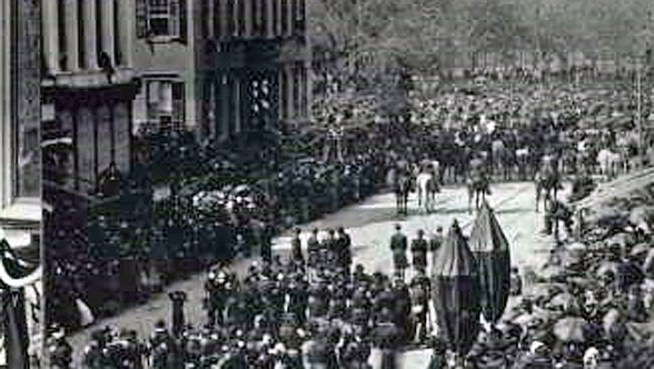Doctor's report on Lincoln assassination discovered by researcher
AP Photo/Library of Congress
Dr.
Charles A. Leale was the first doctor to treat President Abraham
Lincoln after he was shot at a Washington theater on the night of April
14, 1865. Helena Iles Papaioannou, a researcher with the Papers of
Abraham Lincoln Project has discovered an original copy of Dr. Leale's
clinical 21-page report from the night Lincoln was shot.
By Phil Rogers, NBCChicago.com
Researchers
at the Abraham Lincoln Presidential Library are marveling over the
historical equivalent of buried treasure: an up-to-now undiscovered
account of the night Lincoln was assassinated, written by the first
doctor to treat him.
Dr.
Charles Leale was a 23-year-old army surgeon who was in attendance at
Ford's Theatre when John Wilkes Booth entered the presidential box and
shot Lincoln days after the conclusion of the Civil War.
Abraham Lincoln researcher
Helena Iles Papaioannou discovered Leale's account
while searching the records of the surgeon general in the National
Archives in Washington, DC. The 21-page report is Leale's own retelling
of the tragedy, written just hours after the president died the
following morning.
"What
is remarkable about this newly discovered report is it's immediacy and
poignancy," said Daniel Stowell, director of the Papers of Abraham
Lincoln project. "You can sense the helplessness Leale and the other
doctors felt that night, but it does not have the sentimentality or
added layers of later accounts."
The young doctor was sitting just
25 feet away from the Lincoln box, giving him a front-row seat to the
tragedy. He then became the first doctor to treat Lincoln, supervising
his care until the president's own doctor arrived.
The
National Archives has re-discovered a long-forgotten note written by
the doctor who first evaluated Abraham Lincoln after the 16th president
was shot in Ford's Theater. NBC's Pete Williams reports.
"The
theatre was well filled, and the play 'Our American Cousin' progressed
very pleasantly until about half past ten," Leale wrote, "when the
report of a pistol was distinctly heard."
"About a
minute after, a man of low stature with black hair and eyes was seen
leaping to the stage beneath, holding in his hand a drawn dagger."
Leale
described how Booth had become entangled in the flag draping the front
of Lincoln's box in his leap to the stage. Booth broke his leg in the
fall.
"I then heard cries that the 'President has
been murdered,' Leale wrote, adding that calls of "kill the murderer"
and "shoot him" began echoing through the theatre.
AP Photo/Alexander Gardner
Dr.
Charles Leale rushed to the upstairs balcony where Abraham Lincoln had
been seated after hearing the president had been shot. He was the first
to administer aid immediately following the shooting.
"I
immediately ran to the President's box and as soon as the door was
opened was admitted and introduced to Mrs. Lincoln, when she exclaimed
several times, 'O doctor, do what you can for him, do what you can!'"
Leale
said that Lincoln's breathing was "intermittent" and that he could find
no pulse. Using a finger, he removed a clot of blood from the bullet
wound and said Lincoln's breathing became "more regular."
The
doctor described in great detail how he and others carried Lincoln from
the box, down the stairs of the theatre and across the street to the
Peterson house across the street.
"We placed the
President in bed in a diagonal position, as the bed was too short. As
soon as we placed him in bed we removed his clothes and covered him with
blankets. While covering him I found his lower extremities very cold
from his feet to a distance of several inches of above his knees. I then
sent for bottles of hot water, and hot blankets, which were applied to
his lower extremities and abdomen."
Leale said Mary Todd Lincoln entered the room "three
or four times" during the evening and that the president's son, Robert
Todd Lincoln, remained at his bedside throughout the night. Unmentioned
in the report, but well known to history, is the fact that the First
Lady was eventually expelled and kept from the room, her grief was so
intense.
After hours of futile efforts to save the fallen president, Leale described Lincoln's final moments.
"At 7:20 a.m. he breathed his last, and 'the spirit fled to God who gave it.'"
Leale
had received his medical license only six weeks earlier. At the time of
the assassination, he was in charge of a wounded officers' ward at the
United States Army hospital in Armory Square in Washington. He had been
present on the lawn at the White House a few evenings earlier, when
Lincoln delivered what would become his final speech to a crowd
celebrating the surrender of Robert E. Lee and the Army of Northern
Virginia. Booth was present on the lawn that night as well, and many
historians believe he solidified his decision to kill the President that
evening.
Researchers at the Lincoln Library say
that in the ensuing years, Leale rarely discussed his role in the drama.
Indeed, it was not until 1909, 44 years after the assassination, that
he spoke publicly about the events at Ford's Theatre.
New York Public Library Digital Collection
Mourners gather along the street as Abraham Lincoln's funeral procession passes Union Square.








